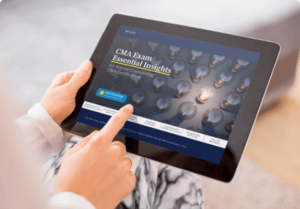TOP TOPICS OF THIS PAGE
To get a better idea of what a Certified Management Accountant is, we’ll review what they do, what the requirements are to become certified, and how the CMA certification compares to the CPA and CFA designations.
Certified Management Accountant Quick Facts
- CMA stands for Certified Management Accountant.
- CMAs specialize in management accounting, strategic management, and business decision-making.
- CMA certification requirements include earning a bachelor’s degree, having two years of relevant work experience, and passing the CMA exam.
- The CMA exam costs about $1,600, and it can take up to seven years to become certified depending on your education and professional experience.
- CMAs earn a higher average salary than CPAs and CFAs.
- A CMA exam review course can help you pass the exam on your first try.
What Does CMA Stand For?
CMA stands for Certified Management Accountant.
CMAs are globally recognized financial accounting experts who use their analytics skills to help businesses make strategic decisions.
So, what is a CMA certification? The CMA designation indicates that a candidate has achieved specific education and professional experience requirements, has passed Part 1 and Part 2 of the CMA exam, and abides by a series of professional ethics standards set by the Institute of Management Accountants.
What Does a CMA Do?
Certified Management Accountants are strategic thinkers that use their analytics skills to improve the overall success of the companies they serve. CMAs work for corporations, not-for-profits, government organizations, and other businesses.
CMAs tend to hold leadership roles and might have the title of financial analyst, financial planner, cost accountant, corporate controller, or even CFO.
Some of the primary support they provide includes:
- Performance management
- Cost management
- Risk management
- Financial analysis
- Decision-making
CMA Certification Requirements
CMA certification requires candidates to have a bachelor’s degree (or approved professional certification), at least two years of full-time work experience in management accounting, and a passing score on both parts of the CMA exam.
Here is the full list of CMA certification requirements:
- Become an IMA member
- Enroll in the CMA Program
- Study for and pass the CMA exam
- Meet education or professional certification requirements
- Meet work experience requirements
- Comply with IMA ethics standards
- Fulfill continuing education requirements
The CMA exam is made up of two parts that are administered separately.
We recommend studying for 72 – 120 hours per section.
Here is a quick overview of what you will be tested on in each section of the CMA exam.
CMA Part 1: Financial Planning, Performance, and Analytics
CMA Part 2: Strategic Financial Management
Part 1 of the CMA exam tests skills related to:
- External Financial Reporting Decisions (15%)
- Planning, Budgeting, and Forecasting (20%)
- Performance Management (20%)
- Cost Management (15%)
- Internal Controls (15%)
- Technology and Analytics (15%)
Part 2 of the CMA exam tests skills related to:
- Financial Statement Analysis (20%)
- Corporate Finance (20%)
- Decision Analysis (25%)
- Risk Management (10%)
- Investment Decisions (10%)
- Professional Ethics (15%)
Ready to take the CMA exam? Pass the first time with UWorld’s CMA Review Course. Compare our packages today.
CPA vs CMA vs CFA
Your career goals will determine whether you want to pursue CPA, CMA, or CFA certification (or a combination of the three).
As discussed earlier, the CMA is a certification for professionals who want to work in strategic financial management, typically in a leadership position where they influence decision-making.
The CPA license makes the most sense for accounting professionals who aspire to work solely in auditing and attestation. And the CFA charter is great for professionals who want to advance their career in investment management.
Here are some key differences between these three designations that can help inform your decision about which one(s) to pursue.
Key Differences Between CPA vs CMA vs CFA at a Glance |
|||
| CPA | CMA | CFA | |
| The Exam | 4-part exam totaling 16 hours of testing | 2-part exam totaling 8 hours of testing | 3-part exam totaling 13.5 hours of testing |
| Recommended Study Hours | 550 hours | 180 hours | 900 hours |
| Pass Rate | 50% | 45% | 46% |
| Annual Continuing Education | 40 hours | 30 hours | 20 hours |
| Experience Requirements | 1-2 years of work experience under licensed CPA | 2 years of work experience in financial management or cost accounting | 4,000 hours of work experience in investment decision-making |
| Average Salary | $76,485 | $120,000 | $91,723 |
| *median base salary
Sources: |
|||
Which Has the Hardest Exam?
Which has the hardest exam, CMA, CPA, or CFA? CMA and CFA would be the hardest exams if we go off of pass rates. CFA pass rates have hovered around 40%, and CMA pass rates are around 46%. CPA pass rates are around 50%.
However, another way to gauge difficulty is by looking at recommended study hours.
The CMA exam has the shortest recommended study hours with 180 (90 hours per exam part), and the CFA exam has the longest with a whopping 900 hours of recommended study time (at least 300 hours per exam level).
The CPA exam also comes in on the higher side with 550 hours (recommended hours per exam part vary).
Which Leads to the Highest Salary?
Out of CMAs, CPAs, and CFAs, CMAs boast the highest average salary with a median annual income of $120,000 in the U.S. CFAs come in second with an average annual salary of $91,723 per year, and CPAs come in last with an average annual salary of $76,485.
Both CFAs and CPAs stand to increase their income by getting dual certifications and earning their CMA.
Wondering how much you can earn if you get your CPA? Be sure to visit our CPA Salary and Career Guide.
In fact, professionals with dual certification of both the CPA and CMA earn 149% more than professionals with neither certification.
Which Is Right for You?
Choosing which certification is right for you is a personal decision that will depend on your career goals and whether you see yourself in management accounting, auditing and attestation, or investment management.
The CFA is the most expensive certification and takes the longest to study for, but it will equip you with the skills needed to excel in asset management and trading. And the CPA is the longest exam with the lowest average salary, but licensed CPAs do make 10 – 15% more than non-licensed accountants.
The CMA on the other hand is the least expensive certification, it is the shortest exam, takes the least amount of time to study for, and results in the highest average salary. It’s also a versatile certification that equips you to help make high-level strategic decisions informed by your extensive financial analysis skills.
Regardless of which certification you choose, UWorld has a prep course to help you pass the exam your first time around.
Is CMA Right for You?
If you see yourself working in corporate accounting and want to grow into a financial leadership role, there is no doubt the CMA can help get you there.
The benefits of pursuing CMA certification include increased job opportunities, career advancement, higher earning potential, instant credibility and respect, and global appeal.
Yes, the CMA exam is challenging, but it’s one of the most practical certifications you can get, and you can always enlist the help of UWorld’s CMA Review materials..
Our personalized study plan, video lessons, practice exams, and more make studying as manageable and efficient as possible, so all you have to worry about is showing up to learn!
If you decide to pursue CMA certification, congratulations! Get ready to set your future and career on a new, higher trajectory.
What Is a CMA – Frequently Asked Questions (FAQs)
Here are some quick answers to frequently asked questions about what the CMA designation is, how long it takes to become a CMA, and how much it costs.
- CMA certification is around $1,600. This includes IMA membership fees, CMA Program fees, and exam registration fees. This does not include the cost to earn your bachelor’s degree or take a CMA exam review course.
- It takes earning a bachelor’s degree plus 2 years’ work experience to become a CMA in addition to passing the Part 1 and Part 2 exams.
- A CMA is a Certified Management Accountant.
- The CMA designation is a certificate awarded to Certified Management Accountants who have demonstrated their expertise in financial planning, performance, and analytics and strategic financial management through education, work experience, and passing the CMA exam.
- A CMA is not a license. It is a Certified Management Accountant designation that is awarded to accounting professionals who have met specific education, experience, and examination requirements and adhere to strict ethical standards.




